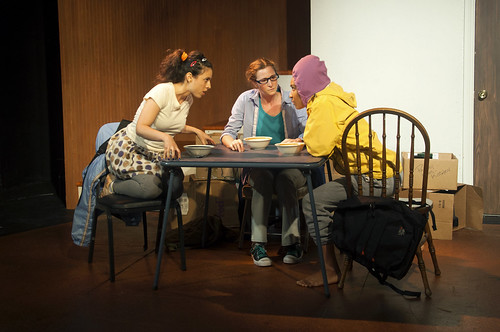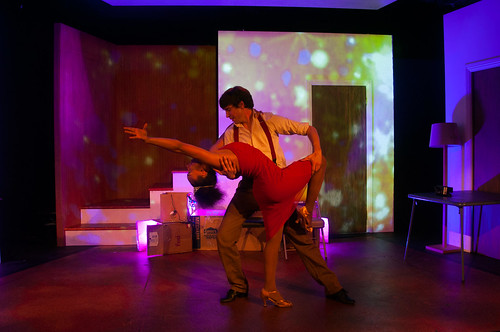Sisters count in SF Playhouse's 1 2 3
 Devin Shacket (left), Jessica Bates (center) and Tristan Cunningham are sisters 3, 1 and 2 in the world premiere of Lila Rose Kaplan's play 1 2 3, part of San Francisco Playhouse's Sandbox Series at the Tides Theater. Below: Cunningham's 2 dances with Jeremy Kahn's Luke in a drama about sisters, family and the scars of childhood. Photos by Fei Cai
Devin Shacket (left), Jessica Bates (center) and Tristan Cunningham are sisters 3, 1 and 2 in the world premiere of Lila Rose Kaplan's play 1 2 3, part of San Francisco Playhouse's Sandbox Series at the Tides Theater. Below: Cunningham's 2 dances with Jeremy Kahn's Luke in a drama about sisters, family and the scars of childhood. Photos by Fei Cai
The three daughters of domestic terrorists – activists, as the eldest girl insists on calling them – have moved so often and changed their names so many times they can't really remember who they are exactly. The easiest thing to do is simply number themselves. 1 will be the eldest. 2 will be the middle child and 3 will be the baby.
When we meet these three smart, malleable children, in the world premiere of Lila Rose Kaplan's 1 2 3, they are in a new town about to head to a new school. Again. The eldest (Jessica Bates) seems older than her 17 years but that's likely because she's had to step up and be the active parent while her parents, who work for an organization they call The Cause, are off blowing things up and making statements about American imperialism. 2 (Tristan Cunningham), who's around 15, seems the most vulnerable. She has affected a tough, petulant exterior, but she's in need. And the youngest child, 3 (Devin Shacket), is a pre-teen, and she's a live wire, full of spark and energy.
What looks to be another ordinary morning of figuring out new names and navigating a new town turns nightmarish when the FBI arrives in full force to arrest the girls' parents for the death of a policeman in one of their explosions. The parents land in jail, and the girls are separated and placed into different foster homes.
All that happens within the first few minutes of Kaplan's play, an intriguing drama sensitively and astutely directed by Lauren English for San Francisco Playhouse's Sandbox Series, a launching pad for new plays.
Once ensconced in their new, admittedly more stable lives, the sisters have a moment to expand. 1 can think about going to college. 3 now has a foster brother whose technology (video camera, HAM radio) feeds into her need for attention and her fantasies of celebrity. The most dramatic impact of tis on 2, who begins taking dancing lessons from an 18-year-old aspiring ballroom dancer named Luke (Jeremy Kahn). In the dancing (and the physical contact) she finds a way to channel her pent-up emotions and take control of some part of her life.
What starts out as a sad, rather grim take on the lives of these children, grows a little lighter. Even tightly wound 1 can take a moment to flirt, window to window, with a boy across the street. Even through their separation, the sisters maintain a strong connection through their regular breakfasts at the diner owned by Luke's mom, and then comes the news that their own mother is getting out of prison early. 2, who sees her parents as despicable terrorists, wants nothing to do with her mother, let alone live in her house, and this causes a tremendous rift between the sisters.
Act 2 jumps ahead in time by about a decade, and whenever time shifts like this happen in a narrative, I get a little nervous. Playwright Kaplan catches us up on the sisters' lives, none of which is going terribly well, and before this nearly two-hour drama is over, there will be another big time jump, and this one doesn't work nearly as well, although the basic idea that the central relationship here isn't necessarily the one you'd expect, comes through in a poignant way.
Director English is also an accomplished actor, and if you know her work on stage, you'll recognize that in her direction. Her production brims with powerful emotion. It is suffused with intelligence and is full of moments that plumb the depths of these complicated young women and their relationships to one another and to the world at large.
These four excellent actors make you feel their connection, even when relationships rupture, and they feel fully immersed in the world of the play, which takes place in what looks like a basement rec room (set and projections by Jordan Puckett) that, with the repositioning of a card table and some boxes, can also be a diner, a dance floor, a Hollywood café and a university lecture hall. There's also a fair amount of dancing (choreography by Sofia Ahmad), of the ballroom variety and the kind that keeps us skipping and tripping through the push and pull of the past while attempting to wrangle life in the present.
FOR MORE INFORMATIONLila Rose Kaplan's 1 2 3, part of San Francisco Playhouse's Sandbox Series, continues through Sept. 5 at the Tides Theater, 533 Sutter St. (second floor), San Francisco. Tickets are $20. Call 415-677-9596 or visit www.sfplayhouse.org.
